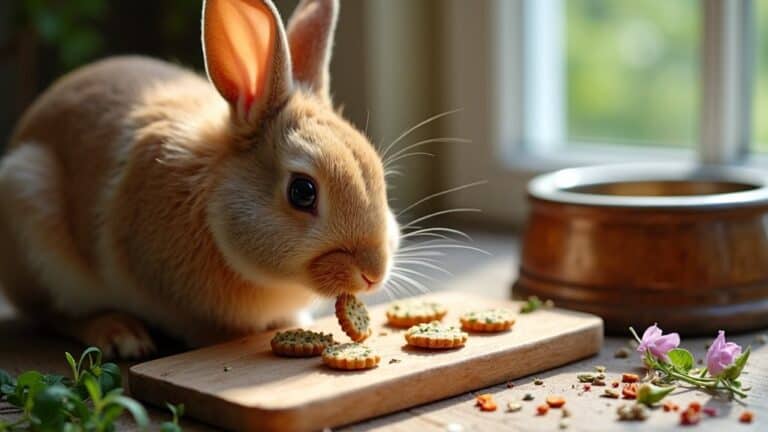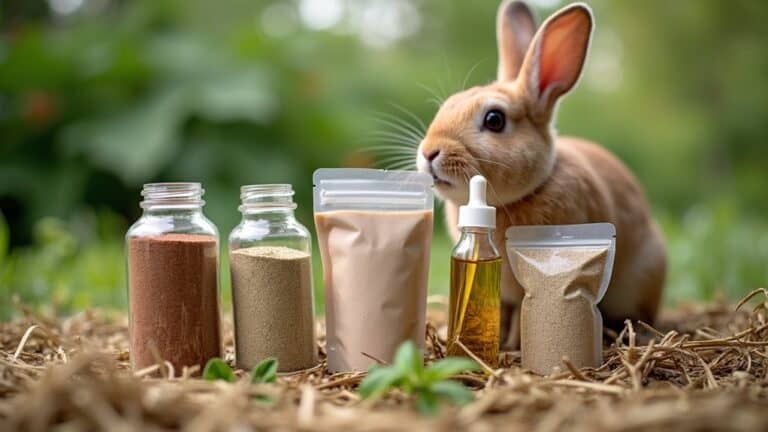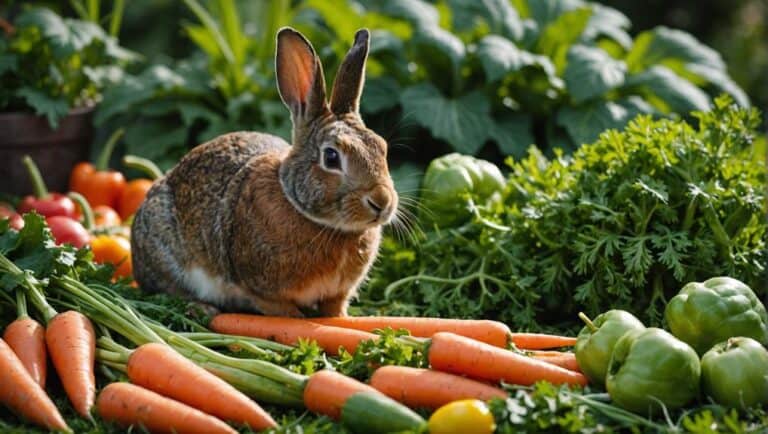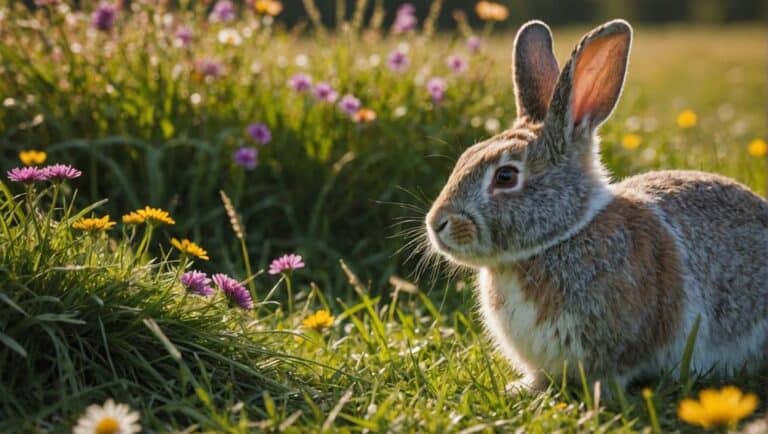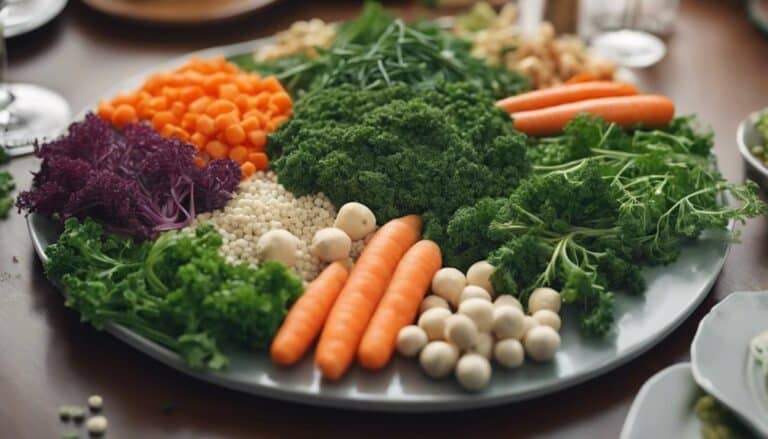It's a curious coincidence that many rabbit owners overlook the significance of high-fiber hay, despite its critical role in their pets' health. You might be surprised to learn that fiber isn't just a filler in their diet; it's essential for preventing serious digestive issues and maintaining dental health. As you consider the implications of a fiber-rich diet, it's worth exploring what types of hay are best and how they contribute to your rabbit's overall well-being. Understanding these aspects could make all the difference for your furry friend.
Contents
Importance of Fiber in Rabbit Diets
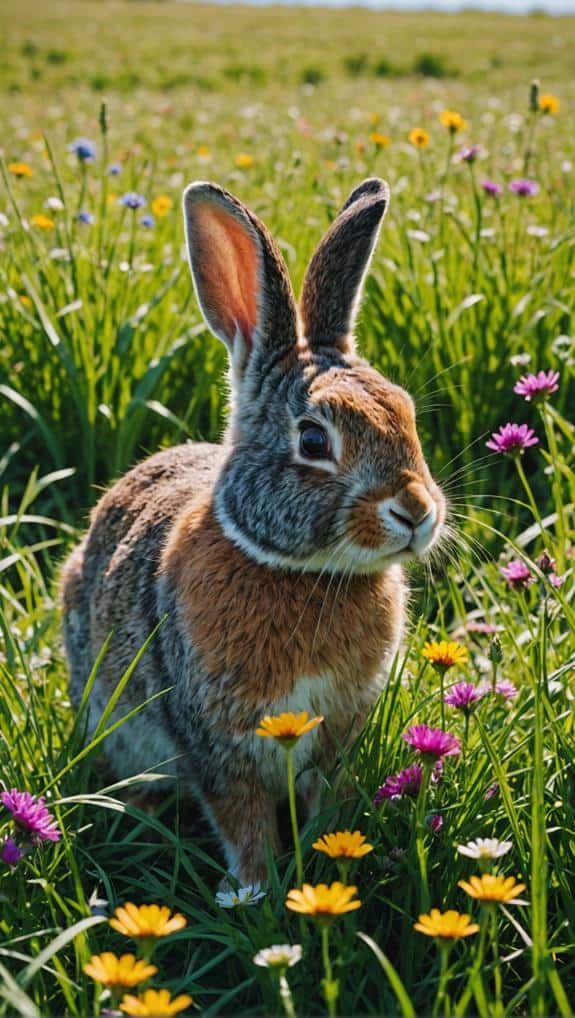
When considering your rabbit's diet, fiber plays an essential role in maintaining their health. A high-fiber diet, primarily composed of hay, is critical for promoting healthy digestion and preventing gastrointestinal stasis, a serious condition that can threaten your rabbit's life. Fiber works by encouraging the natural movement within the digestive system, guaranteeing that food passes through efficiently. Additionally, hay is fundamental for the production of necessary fecal pellets and cecotropes, which are key for a rabbit's digestive health and gut bacteria growth the significance of hay.
Incorporating around 80% hay into your rabbit's diet not only aids in digestion but also supports the natural wear of their teeth. Insufficient chewing can lead to dental diseases, which are common in rabbits that don't receive adequate fiber.
Different types of fiber, including both soluble and insoluble varieties found in hay, contribute uniquely to your rabbit's metabolic health and gut flora.
Moreover, insufficient fiber intake can lead to serious issues such as obesity, nutritional deficiencies, and gut slowdown. Consequently, it's imperative to provide frequent access to high-quality grass hay, like Timothy hay. This guarantees your rabbit consistently meets their fiber needs, supporting proper nutrient absorption and maintaining a healthy gut.
Prioritizing fiber in your rabbit's diet is essential for their overall well-being.
Types of Hay for Optimal Nutrition
When selecting hay for your rabbit, it's crucial to focus on grass hay varieties, particularly Timothy hay, which offers numerous nutritional benefits.
This high-fiber option not only supports digestive health but also promotes dental care by encouraging natural chewing behaviors.
Regular access to quality hay is imperative for preventing gastrointestinal issues and maintaining overall health, as it provides necessary fiber for proper gut function and reduces the risk of dental problems critical for rabbit health.
Additionally, incorporating leafy greens into their diet can further enhance their nutrient intake and overall wellbeing.
Grass Hay Varieties
Three main grass hay varieties—Timothy, Orchard grass, and Meadow hay—provide essential nutrients and fiber critical for a rabbit's health.
Timothy hay is often the go-to choice for adult rabbits due to its high fiber content, promoting healthy digestion and preventing gastrointestinal stasis. Its coarse texture encourages natural chewing behavior, which is important for dental health. Additionally, high-quality hay contributes to overall rabbit well-being by enhancing digestive health and preventing issues like GI stasis, as recommended in dietary guidelines.
Orchard grass hay presents a softer alternative, making it appealing for picky eaters while still fulfilling their fiber intake needs. This variety can be especially beneficial for rabbits that may struggle with tougher hays, guaranteeing they receive the necessary nutrition without sacrificing taste.
Meadow hay, with its diverse blend of grasses and plants, offers a varied nutritional profile. This variety not only supports healthy digestion but also stimulates a rabbit's natural foraging instincts, enriching their overall well-being.
For best health, aim for about 80% of your rabbit's daily diet to consist of high-quality grass hay. By selecting from these varieties, you can make certain your rabbit enjoys a balanced, fiber-rich diet that supports their health and happiness.
Benefits of Timothy Hay
Timothy hay stands out as a cornerstone of a rabbit's diet, offering numerous benefits that cater to their specific nutritional needs. As a premium grass hay, it boasts high fiber content, essential for maintaining ideal digestive health in herbivores like rabbits. This fiber promotes regular bowel movements and prevents gastrointestinal stasis, a serious condition that can arise from inadequate fiber intake.
Timothy hay's balanced nutritional profile makes it perfect for adult rabbits, providing essential nutrients without the excessive calcium and protein found in legume hays like alfalfa. Its fibrous structure encourages natural chewing behavior, which is significant for dental health; it helps wear down your rabbit's constantly growing teeth, reducing the risk of dental disease.
Additionally, Timothy hay is available in various cuts, allowing you to choose the right type based on your rabbit's age and dietary needs. First cut is particularly high in fiber, while second and third cuts offer softer textures and richer nutrients.
Incorporating Leafy Greens
Incorporating leafy greens into your rabbit's diet can greatly enhance their overall nutrition and health. While high-fiber hay forms the foundation of their diet, leafy greens like romaine lettuce, cilantro, parsley, kale, and arugula can provide essential vitamins and minerals.
It's essential that these greens make up only about 20% of your rabbit's daily intake to maintain a balanced diet.
A mix of different leafy greens not only boosts nutritional diversity but also encourages natural foraging behaviors, which is important for your rabbit's well-being. When introducing these greens, do so gradually to prevent digestive upset, allowing your rabbit to adjust effectively.
This approach supports their digestive health, ensuring that their gut remains stable.
Additionally, incorporating vegetables in moderation alongside high-fiber hay can enhance hydration and complement fiber intake. This combination optimizes digestive health by promoting proper gut function.
Health Risks of Low Fiber Intake
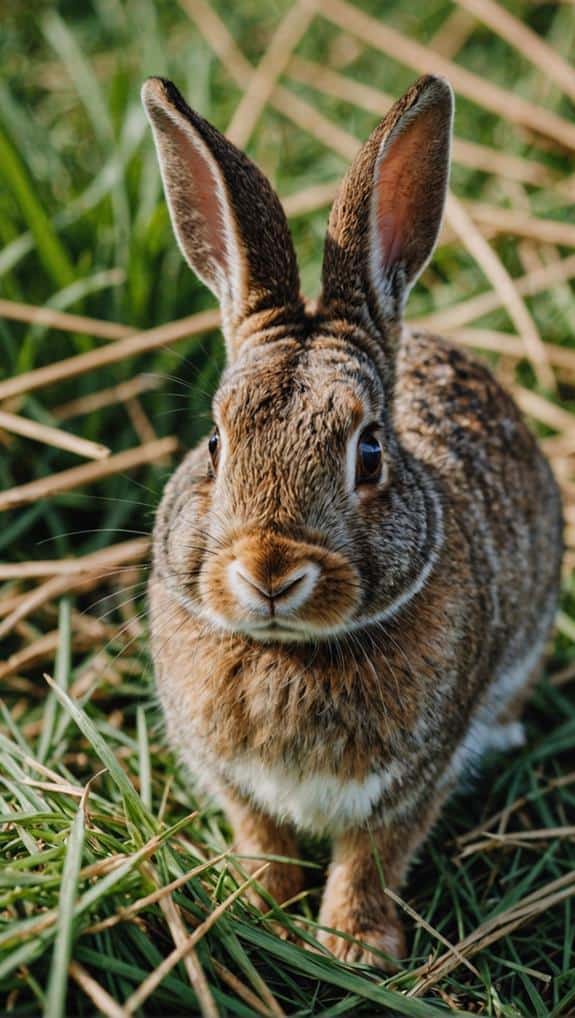
A low fiber diet puts your rabbit at significant risk for dental disease, as inadequate chewing leads to poor tooth wear and overgrowth.
Additionally, insufficient fiber can trigger gastrointestinal stasis, a serious condition that can halt digestion entirely.
It's vital to understand these risks to guarantee your rabbit remains healthy and happy.
Dental Disease Risks
When rabbits consume low fiber diets, they face considerable dental disease risks due to inadequate chewing material that fails to wear down their continuously growing teeth.
Insufficient fiber intake not only limits the natural grinding action but also increases the likelihood of tooth overgrowth, leading to painful conditions like malocclusion, where teeth misalign.
This misalignment can cause discomfort and difficulty eating, severely impacting a rabbit's overall health.
A high-fiber diet, particularly one rich in fibrous hay such as Timothy hay, is crucial for maintaining dental health.
The rough texture of hay encourages proper chewing, effectively wearing down teeth and minimizing the formation of sharp spikes that can result in oral sores and infections.
Regular assessment of your rabbit's diet and ensuring an adequate supply of fiber can markedly reduce the risk of dental disease.
Gut Stasis Concerns
Continuing from the discussion of dental health, low fiber intake in rabbits poses significant risks for gut stasis, a serious condition where the digestive system slows or halts entirely.
When rabbits consume insufficient high-fiber foods, such as alfalfa hay, it reduces the motility of their digestive tracts. This slowdown can lead to blockages, increased discomfort, and potential life-threatening complications.
A diet lacking in woody stems and fibrous materials disrupts the balance of gut flora, essential for efficient digestion and nutrient absorption. This imbalance can further exacerbate gut stasis, making it critical to prioritize high-fiber options.
Rabbits need to chew to wear down their continually growing teeth; without adequate chewing activity, dental issues arise, leading to even more digestive problems. To prevent these issues, providing rabbits with a variety of chewable items, such as hay, vegetables, and specially designed toys, is crucial for their dental health. Additionally, regular veterinary check-ups can help detect early signs of dental problems before they escalate. Interestingly, one might wonder, do rabbits possess muscle tissue, and the answer is yes; this tissue is essential for their movement and overall body function, just as it is for all mammals.
Moreover, a low fiber diet can contribute to obesity, compounding the risks associated with gut stasis. Ensuring your rabbit has constant access to high-fiber hay is fundamental for maintaining their health and preventing these serious conditions.
Feeding Guidelines for Rabbits
To guarantee your rabbit thrives, a well-balanced diet is vital, consisting of approximately 80% hay and 20% fresh vegetables.
For adult rabbits, Timothy hay is the recommended primary choice of grass hay due to its high fiber content and balanced nutrients. While alfalfa hay is nutritious, it's best reserved for young rabbits or those needing weight gain, as it's too rich for adults.
Incorporating small amounts of high-fiber pellets can supplement your rabbit's diet, but remember, these shouldn't dominate their intake. Over-reliance on pellets can lead to digestive issues.
When introducing fresh vegetables, do so gradually, allowing your rabbit to adapt without causing digestive upset. Good options include leafy greens like kale or romaine lettuce.
Additionally, monitor your rabbit's water intake. Proper hydration is vital for the effectiveness of a high-fiber diet, as it aids in digestion and helps prevent gastrointestinal stasis.
Benefits of High Fiber Hay

High fiber hay is the cornerstone of a rabbit's diet, offering a multitude of benefits vital for their health. Incorporating high fiber hay into your rabbit's meals promotes a healthy digestive system, indispensable for preventing gastrointestinal stasis—a potentially life-threatening condition. The long, indigestible fibers found in hay help maintain intestinal motility, ensuring that food moves through the digestive tract efficiently.
Additionally, shorter digestible fibers support effective processing in the caecum, optimizing nutrient absorption.
Furthermore, a diet rich in high fiber hay protects rabbits against dental diseases. The necessary chewing action encourages the wearing down of their continuously growing teeth, preventing painful dental issues. Timothy hay and other grass hays should comprise about 80% of your rabbit's diet, providing essential nutrients while avoiding excessive calories and carbohydrates often present in pellets.
Moreover, high fiber hay consumption contributes to maintaining a healthy weight in rabbits. Fiber plays a significant role in regulating metabolism and enhancing gut flora, reducing the risk of obesity-related health problems.
Natural Feeding Practices for Rabbits
Providing high fiber hay is just one aspect of a holistic approach to rabbit care that emphasizes natural feeding practices.
To guarantee your rabbits need the right diet for peak digestive health, focus on these key practices:
- Prioritize High-Fiber Hay: Make high-fiber hay, like Timothy or Orchard grass, about 80% of their daily intake. This supports their digestive health and prevents gut stasis.
- Encourage Foraging: Use hanging nets or cardboard tubes filled with hay to promote foraging. This mimics their natural behavior and keeps them mentally stimulated.
- Introduce Greens Gradually: If you want to add fresh leafy greens, do so slowly. Focus on darker greens like romaine lettuce and cilantro to maintain a balanced diet.
- Limit Processed Foods: Minimize processed foods and refined sugars. This aligns with their natural diet and helps reduce obesity and dental issues.
Lastly, always provide clean, fresh water alongside their high-fiber hay.
These practices not only support your rabbits' health but also enhance their overall well-being. Implementing these natural feeding strategies will lead to happier, healthier rabbits.
Enhancing Diet With Fresh Vegetables

Incorporating fresh vegetables into your rabbit's diet can greatly enhance their nutrition and overall health. Fresh vegetables should comprise about 20% of their daily intake, complementing the high fiber hay that forms the foundation of their diet.
Leafy greens, such as romaine lettuce, cilantro, and parsley, are excellent choices, providing essential vitamins, minerals, and hydration. These choices also support your rabbit's digestive health.
You can introduce non-leafy vegetables like bell peppers and broccoli in moderation for variety. However, it's vital to start with small amounts when offering new vegetables, gradually increasing the quantity to prevent any digestive upset.
Always wash and prepare the vegetables thoroughly, removing seeds or pits, to guarantee safe consumption.
Final Thoughts
Incorporating high-fiber hay into your rabbit's diet is essential for their health and happiness. Can you imagine your rabbit thriving, with a shiny coat and strong teeth, simply by enjoying a variety of hay daily? By prioritizing fiber, you not only prevent health issues but also support their natural behaviors. Remember, a well-balanced diet rich in hay and fresh greens is key to keeping your furry friend active and vibrant. Invest in their nutrition today for a healthier tomorrow.

